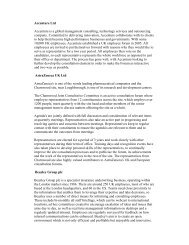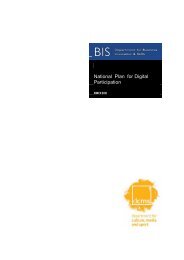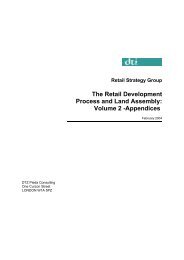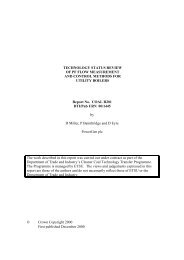Public Policy: Using Market-Based Approaches - Department for ...
Public Policy: Using Market-Based Approaches - Department for ...
Public Policy: Using Market-Based Approaches - Department for ...
Create successful ePaper yourself
Turn your PDF publications into a flip-book with our unique Google optimized e-Paper software.
INCENTIVES<br />
Where citizens can exercise choice regarding how much of a publicly-provided<br />
good or service they consume, care must be taken to ensure that this does not<br />
create an incentive to over-consume. For example, choice between providers in<br />
the French health care system may be associated with its ranking as number one<br />
in the World Health Organisation’s assessment of world health care systems, but<br />
also with its high expenditure per capita on health. The fact that the French<br />
consume three times as many antibiotics as the Germans and twice as many<br />
anti-cholesterol drugs as the British, <strong>for</strong> example, suggest that the French<br />
system may encourage over-consumption of health services. 215<br />
INFORMATION ISSUES<br />
Section 12 – Issues in the implementation of market mechanisms<br />
As noted previously, consumers must be able and willing to gather and process<br />
sufficient in<strong>for</strong>mation if they are to make rational choices. In<strong>for</strong>mation issues can<br />
lead to high costs of providing enough in<strong>for</strong>mation and support, and greater<br />
inequality if in<strong>for</strong>mation is more readily accessible to some groups of society<br />
than others.<br />
In<strong>for</strong>mation issues are of particular significance <strong>for</strong> experience and credence<br />
goods, which both require decisions be made with no ex ante knowledge of<br />
quality. In credence goods, the consumer cannot even learn from previous<br />
experience because he does not know whether he received an appropriate<br />
quality of service, even after consumption has taken place. In other words, he<br />
must trust the in<strong>for</strong>mation he is given to make his decision.<br />
The costs of providing in<strong>for</strong>mation and support in choice-based lettings have<br />
been significant, with pilots reporting advertising costs as the main component<br />
of scheme operating costs. However, this approach seems to have been effective<br />
in encouraging participation and limiting inequality. In education, consumer<br />
feedback suggests the majority of participants feel they are provided with the<br />
right in<strong>for</strong>mation to make their decisions. For example, a study conducted <strong>for</strong><br />
the DfEE found that 87 per cent of parents interviewed were satisfied they had<br />
the in<strong>for</strong>mation they needed to help them choose a school. 216<br />
The impact of in<strong>for</strong>mation issues when introducing user choice to credence<br />
goods are most clearly seen in the case of healthcare services. For example,<br />
patients may exercise choice in the NHS by selecting their GP and the hospital<br />
they attend in some cases. 217 Research shows patients are unlikely to switch GPs<br />
or travel beyond their local hospital, even if they are dissatisfied with the<br />
service. 218 Although this will at least partially reflect travel costs, it also points to<br />
215 Aldridge, S. (2004). Presentation at the Social <strong>Market</strong> Foundation Seminar on Choice.<br />
216 Quoted on p.15 of LGA (2004) Enabling Choice: Research on Choice in <strong>Public</strong> Services.<br />
217 These include choice of GP and choice of hospital consultant <strong>for</strong> all patients, and choice of hospital only <strong>for</strong><br />
patients who have been kept waiting <strong>for</strong> longer than the target <strong>for</strong> elective surgery.<br />
218 See p.23 andp.27, LGA (2004) Enabling Choice: Research on Choice in <strong>Public</strong> Services.<br />
187
















